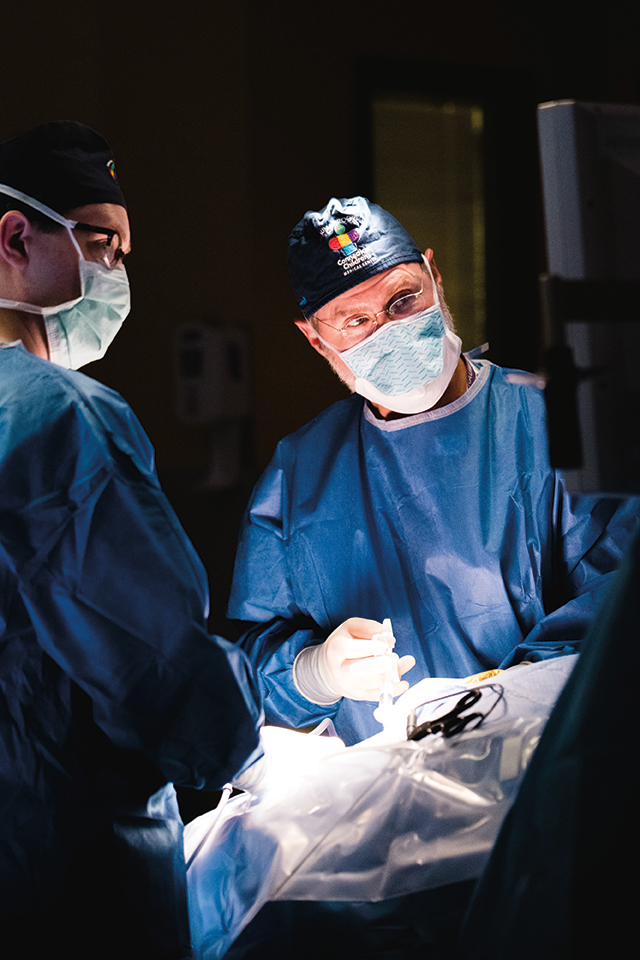Brendan T. Campbell, M.D., M.P.H., ’92
 DEGREES:
DEGREES:
B.S. in biology, with interdisciplinary minor in Soviet studies; M.D., University of Connecticut; M.P.H., University of Michigan
JOB TITLES:
Donald W. Hight Endowed Chair in Pediatric Surgery and chief surgical quality officer at Connecticut Children’s Medical Center; professor of surgery and pediatrics at the University of Connecticut School of Medicine
FAVORITE TRINITY MEMORY:
I have many notable memories from my time at Trinity, but here’s one favorite. Craig TenBrink, Pete Cuomo, and I made a bet with Jim O’Brien, and the loser(s) had to streak across campus. The three of us lost the bet, or at least we couldn’t prove that we had won the bet. So, at halftime of a Monday night football game in early December, Noah Eccles drove us across campus to make good on the bet. After being dropped off on Vernon Street, we began our jog back to Clemens Hall along the Lower Long Walk. Even without cell phones, word had traveled fast, and we had at least what seemed like several hundred of our classmates cheering us on and others who were just wondering why three idiots were running naked across campus on a cold December evening.
What was your path to your current position?
My path was geographically circuitous over nine years of postgraduate surgical and research training, which included time in Chapel Hill, North Carolina; Ann Arbor, Michigan; and Little Rock, Arkansas. Along the way, I met and married my wife, Angela, who grew up in Iowa. We were not dead set on moving to the Northeast when I completed my training and was looking for my first job, but the opportunity at Connecticut Children’s had everything I was looking for, and they really needed another pediatric surgeon at the time.
What do you do in your various roles?
I wear a lot of hats at Connecticut Children’s and through my work with the American College of Surgeons. Much of this work involves building programs and systems that are designed to improve the care for surgery and trauma patients. A thoughtful mentor told me that one of the keys to having high job satisfaction is simply prioritizing impactful work, and my current job allows me to do that.
What do you enjoy most about what you do?
Providing care to infants and children with problems that can be improved or corrected with a surgical procedure can be very rewarding and makes you want to come to work most days. It also motivates you to continuously work to get better because perfection in pediatric surgery is an elusive goal. I also enjoy having the opportunity to teach and mentor students and residents and focus part of my nonclinical work on improving care at the population level through my health services research and advocacy work related to surgical quality, injury prevention, and trauma systems.
How did your time at Trinity prepare you for your career?
The science courses I took at Trinity certainly prepared me well for medical school, where the first two years focus on the scientific basis of clinical medicine. But the most valuable aspect of my Trinity education that continues to serve me well is the liberal arts foundation that taught me to think critically and to write clearly. I tell anyone who will listen that my parents are still getting value from their investment in my Trinity education because I continue to utilize these skills in my daily work.
Did you have a professor who was particularly influential?
There are several exceptional Trinity faculty members who challenged me and contributed in important ways to my liberal arts education—Kathleen Archer (biology), Robert Battis (economics), Carol Clark (economics), Don Galbraith (biology), James Heeren (chemistry), Sam Kassow (history), and Craig Schneider (biology).
What was the most memorable course you took at Trinity?
“Organic Chemistry” with Professor James K. Heeren. The content of this course was not particularly interesting or useful, but it was more intellectually challenging and demanding than anything I had to master before. This course and Professor Heeren’s method of teaching helped me learn how to process, retain, and apply a large amount of complex information. Professor Heeren let you know at the outset what his expectations were, and he taught using the Socratic method, which motivated you to show up prepared for class every day. He told us early on that if you could master the material he presented in his course and do well, you would be able to manage the volume and complexity of information presented in medical school. He was right.
